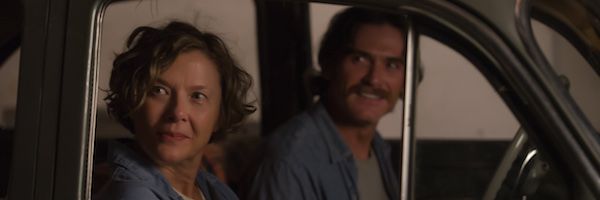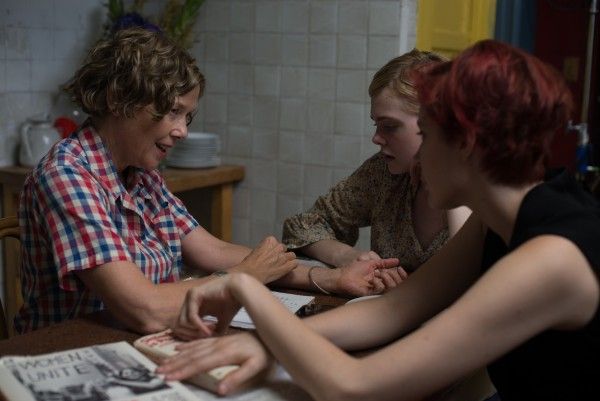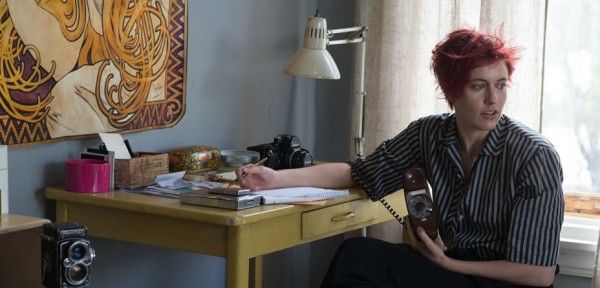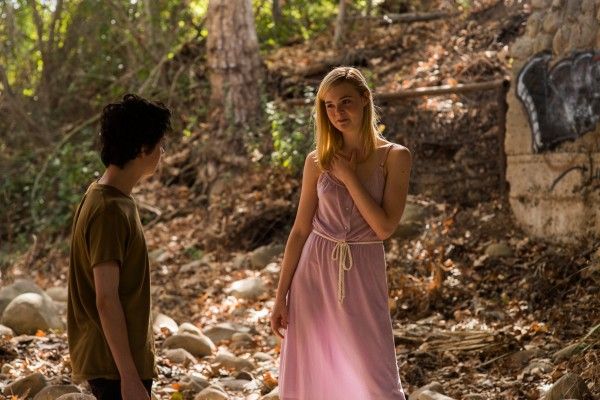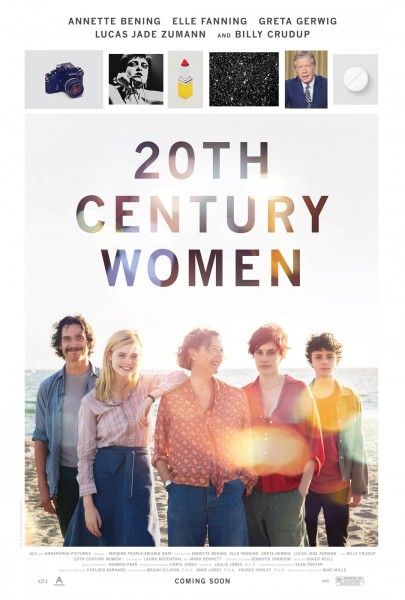[This is a re-post of our 20th Century Women review from AFI Fest 2016. The film is currently playing in limited release and expands nationally this weekend, January 13. We're also giving away advance tickets, RSVP here.]
It’s Santa Barbara, 1979. A mother, Dorothea (Annette Bening), has asked two young women to help her raise her teenage son by giving him guidance on how to be a respectful, knowledgeable, decent and creative man. One of those, Julie (Elle Fanning), is a 17-year-old friend who’s been climbing through her son’s window for years to platonically sleep in his bed and tell him her various exploits with older boys or issues at home. The other, Abbie (Greta Gerwig), is a 20-something survivor of cervical cancer who attends punk rock shows, takes photographs and lives in Dorothea’s craftsman house (paying rent, of course; late, but still rent).
That request is a line of dialogue from Dorothea to each woman and that’s the closest aspect of a plot that 20th Century Women has. Women doesn’t chart the major coming of age moments, but this film is certainly the next step in Mike Mills’ (Beginners) coming of age as a filmmaker. Instead of having a standard through line coming-of-age structure, 20th Century Women plays like a collage of cultural capital references, felt very much in the bones of each talented actor. With every touchstone inclusion Mills makes sure that it counts as a building block for the character. You can call it indie movie bingo, but it’s really about a time for individual revolution via cultural capitalism before the dawn of the 80s global capitalism.
There are read sections from the feminist necessity Our Bodies, Ourselves, there’s a mixed-tape-making session cut to Suicide’s “Cheree”, there’s a skateboard park fight over Black Flag vs. Talking Heads and there's a realization that Jimmy Carter's speech about consuming less was the death knell for his re-election and for the mythos of Americans banding together for the greater good. Although it’s constant, Mills’ method of namedropping and cataloguing is anything but cheap. In the script, he shows each character who has an influence over his young-Mike-Mills stand-in, Jamie (Lucas Jade Zumann), presenting both art and ideas as a method in which they cope with day to day life. For 20th Century’s mood, this capital feels like a visual extension of some of Mills’ best works in visual art, which often use found images presented in a new context alongside other images to give a sense of how each part of culture responds to and informs the time period in different ways. Every needle drop and every flip of an author’s page is intensely felt because we are getting to know characters through their cultural choices.
This isn’t just a character putting on a twee song and saying, “this song will change your life.” Mills shows us the ways in which music and books and dinner conversation literally change our lives because they help shape a person and make them a sponge. And although he introduces his characters through cultural touchstones, each person is wholly defined and 20th Century Women reveals itself to be a film wherein Mills thanks all the divergent actions and ideas from the women in his younger life. It’s chaotic, messy and genuinely heartfelt—just as love itself is.
Abbie is a firecracker that challenges Dorothea’s second wave of feminism by talking openly about her menstruation at a dinner party and asking the other housemate, William (Billy Crudup, charming as always), to seduce her as if she’s a new model who doesn’t understand the boundary between photographer and subject. She also tells Jamie that he should freeze out Julie and not allow her to come into his room without being physical. In most movies, she’d be the disruptor, but she has the absolute best of intentions with Jamie, Dorothea and Julie. She’s someone who’s been wounded and uses music and feminism to fill in the cracks of wounds, but wants to keep them from experiencing similar wounds. And Gerwig, who’s been phenomenal in her co-written collaborations with Noah Baumbach, gives her most complete and touching performance.
In terms of awards and release strategy, 20th Century Women is set up to be an early career-capping ode to Bening and she is very good, but she more so hangs as a luminary presence over the film—as a mother truthfully should. After picking up Jamie and Abbie from a punk rock show and they’re obviously altered by substances, Dorothea both laments and is happy to know that she’ll never see her son as he presents himself to others in the real world. There’s a later scene where Jamie reads aloud a feminist essay about older women and Dorothea recoils and wants her son to understand that women can’t be easily defined as being one way or being lesser if they’re not that one way. The parental relationship has warm edges that comfort and guide us, but the centers of self between a son and a mother will always withhold certain truths. We have a feeling about each other but there’s a certain loving allowance for detachment. And that’s how 20th Century Women feels; neither Bening nor Mills try to create a perfect understanding of the matriarch, nor an idealized one.
Like Mills’ own artwork, you bring yourself and your life experiences to your response to his piece. While many of the cultural touchstones that he uses in 20th Century Women are very meaningful to me—and even though I’m someone who’s largely been shaped by female friends and my mother—I think that there’s enough warmth here to pull most audiences through, regardless.
For example, there’s a scene where Abbie and Jamie are listening to The Raincoats. The Raincoats were a formative band for a future masculine softy, Kurt Cobain, and he released the album that we’re hearing in 1979 at the height of Nirvana (that type of influence is formative for the film; women who influence each other and women who influence men). Dorothea asks if the women playing guitar and singing out of tune know that they’re untalented and if that’s the point? Abbie beautifully expresses that they are so passionate about rock ‘n roll they bypass the requirement for formal talent and the end result is that if you can hear how primal and necessary what they’re doing is and you get swept up in their passion for the art form. That’s how Mills is as a filmmaker. He might not have formal structure or conflict, but if you let yourself get swept up in his delicate and mesmerizing tapestry—you’ll be rewarded.
Grade: B+

